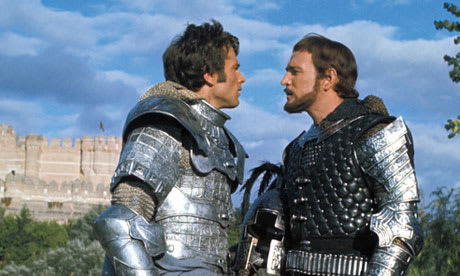The story of King Arthur, told through the music and lyrics of Lerner and Lowe (My Fair Lady), was a cultural touchtone of the '60s, both the Broadway version, which John F. Kennedy famously identified with, and its big screen adaptation, a lavish, "spare no expense" production shepherded by the last studio mogul then still in business, Jack L. Warner. Sadly, its place in pop culture history notwithstanding, the film has withered with age; it's a dated spectacle without the memorable songs or performances of its '60s contemporaries, such as West Side Story, Sound of Music or Oliver! The story plays out as we expect, told mostly in flashbacks before the moment of Arthur's confrontation with old friend Lancelot. We see Arthur's romantic courtship with Guinevere, their unification as king and queen, the formation of the round table, the introduction of the master French knight Lancelot du Lac, Arthur's conflict with Morgana and his illegitimate son, Mordred, and the overarching, strenuous love triangle between Lancelot, Guinevere and Arthur. The themes that stuck with Kennedy are strong ― the internal struggle of being a man and a king, and the responsibilities as leader first and husband second. Unfortunately these nuances get lost in a shabbily designed and executed film dated by the prevailing and ugly aesthetic trends of the psychedelic era, from Richard Harris's atrocious haircut and furry costumes to the choppy editing style, which at the time may have seemed progressive, but today just looks sloppy. Vanessa Redgrave is typical '60s eye candy as Guinevere, dressed in swinging '60s high hair and faux fur. And Franco Nero, the original Django, is campy and somewhat laughable as Lancelot. Joshua Logan's direction is sporadic, often astounding with big scenes of epic scope but underwhelming when it comes to intimate dialogue. Sadly, despite the Blu-Ray, the HD treatment is lacklustre, producing no pop or spark of clarity to wow us. As with the content, the picture looks dull and flat. Energetic commentary from critic Stephen Farber is enjoyable, providing unbiased critical opinion, both good and bad, along the way. While clearly a fan of the film, he's not shy in making us aware of its follies. The Warner packaging, as expected, looks great, and includes the glossy liner notes and the accompanying CD soundtrack. As well as the the Farber commentary, there's a wealth of production featurettes that will likely satisfy die hard fans of the film, but for mild curiosity seekers, this isn't the best representation of the grand musical spectacles of the '60s.
(Warner)Camelot
Joshua Logan

BY Alan BacchusPublished May 11, 2012